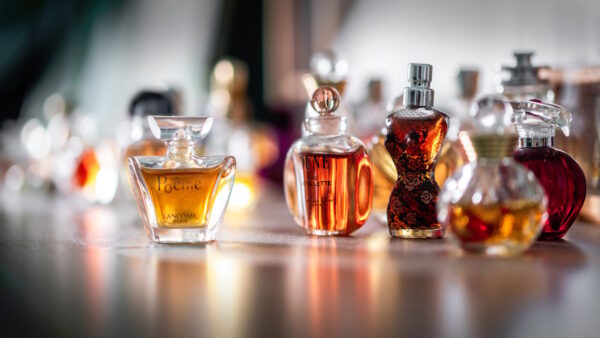Of Sense, Scents, and the Sensorium: Atomizer by Elizabeth A. I. Powell

In the early crisis months of the pandemic when anosmia, or lack of smell, became a noted symptom, the first thing I did each groggy somnambulist morning was to unstop a bottle of perfume: if I could smell its fragrance, I could assure myself that I might not be sick.
Strangely, I now associate Chanel’s “Cristalle” with the ambient anxiety of airborne infection. But such is the associative power—and occasional perversity—of smell.
Elizabeth A. I. Powell’s Atomizer delves into the world of olfaction, splintering the old chestnut that “the nose knows” to investigate ways in which our instincts, our bodily senses can lead us astray and even into danger. An atomizer, used in medicine as well as in the cosmetics industry, converts a liquid into airborne droplets by propelling it through a small aperture. True to its conceit, this collection, while focused on our least acknowledged sense, grapples with a range of subjects—from animal husbandry and abortion to online dating and baseball—in which our instinctual lives (and the seemingly natural objects of our fears and desires) are shaped by our technologies and laws, our acculturated appetites and pastimes.
Powell invokes perfume as her neurobiological muse: “Let the atomizer do what it does best: release the distance between / autobiography and critical analysis.” In three sections dedicated to perfume’s “top notes,” “heart notes,” and “base notes” (so named for the length of time they linger), her speaker grapples with the long shadow of serious childhood neglect, an adolescence bizarrely split between a grandmother’s dairy farm and a mother’s closeted lesbian affairs in the city, and an adulthood navigated between horizons of achievement and shoals of legitimate despair.
At the heart of this collection is the speaker’s self-interrogation in the wake of an abusive relationship, one in which a lover used colognes, among other tricks, to allure her. Gas-lit and physically abused, the speaker scrutinizes her life in the wake of this travail to figure out how it happened and how, freed from it, she survived. Reconnaissance leads her back in time to childhood, to a perfume shop where she spent hours with a kindly shop owner who showed her more care and attention than her own parents. In the opening poem, the speaker connects these dots, tracing the etiology of an unmet need, turned vulnerability.
And whosoever shall bring me back to the child inside the child, my
Matryoshka girl daemon inside me, lure her with whiffs of potions, will lead
me anywhere. Trance state.
[. . . ]
Love has many scents. He used scent to confound, to throw me off the trail
of who he really was, which may be just another word for emptiness. How
he found the scent that described my memory to my desire and it smelled so
good I had no choice but to love him when his cheek slipped next to mine.
As in exorcism or surgery, the speaker clinically assesses the ways in which this malignancy found its way into her life. In doing so, she comes to an understanding of the complexities of attraction, seduction, and betrayal, which implicates the limbic system and dating algorithms, olfactory neurons and the porousness of restraining orders.
“The art of womanhood in my time” is the poet’s stated subject, albeit with a hearty daub of irony. Yet few poets grapple with midlife contingency and the landscape of female experience with Powell’s poignant humor. Consider the opening passage of “When the Insemination Man Comes to the Farm”:
With his tall gray boots, strange protective white
bodysuit as if he were going to do something radioactive,
I'm young; I don't understand; I hide behind hay bales
with the heifers; and we start to grow up.
Impregnation is like having a train coming at you, hitting you, going
in reverse, coming at you again,
hard.
The insemination man with his ramrod, not quite a penis,
threading it through the cervix. All his disgusting canisters.
Never trust a dude in a white van.
As a “small sassy child in coveralls and red bandana,” the speaker witnesses the mechanics of reproduction as she rests against the placid side of the eldest cow, which gently licks the speaker’s hair. The grandmother’s farm is not a Romantic idyll, but it is a comparatively nurturing spot, one to which she imaginatively returns when she finds herself, in mid-life, unmoored, “a conspiracy theory to myself.” For the grown adult who, as a child, had to parent herself, this distrust of the dialogue between instinct and rationality is one result of having had to serve as one’s own guardian and disciplinarian. When there is no parental dyad, the precocious child has to play both sides—squandering the fancy of childhood and the balance developed over years of give-and-take. Or, as Stevie Smith opined: “Oh it is not happy, it is never happy / To carry the child into adulthood.”
Like Smith, Powell is unwilling to settle for the readymade answers offered by psychotherapy, commercialism, or unfaithful lovers. The reader can’t help but be gripped by her poems’ casual tragicomedy, gleaned from the dilemmas of everyday life. In “E-Diptych,” she writes of online dating: “We are invented, by the wanting / and not having of others.” Yet, this moment of insight is reflexively leavened:
… I had the sneaky feeling you were an über
Aryan chiropractor with autoerotic
tendencies, that maybe I should re-up
with my academic Asperger's husband,
wear muumuus on Saturday nights.
Shopping for a mate has its liabilities, whatever the medium. But it is the Balzac-like eye that Powell trains on this modern conduit of intimacy that redeems it from high-stakes sexual sport. If the drawing room was Jane Austen’s theater, and the local bar or workplace the romantic stage in sit-coms of the Reagan era, Powell has surveilled the postmodern dating scene in its new versions of cruel hilarity. As her speaker states about a condescending date, “[You] hugged me as if you were Princess Diana, / and I, a grateful patient in the ward,” and who hasn’t been on the giving or receiving end of that performative embrace.
For all its emphasis on scent, Powell’s collection is also frequently ekphrastic, drawing on the works of Georges Seurat and Jean Beraud as well as Chuck Close and Judy Chicago. But ultimately, it is her capacious eye that rewards.
This is why I moved to the country?
Everyday is a hipster convention. Girl with $300 jeans,
sports her “ANTIFA” t-shirt and cork-heeled shoes.
I agree with her, but, but, but . . .
I would like some $300 jeans. Maybe. I think
of the poem “Sir Patrick Spens”: I have grown inpatient, I mean
impatient. Fake farmers in overalls selling their window-grown wheatgrass.
[. . .]
this used to be Vermont now it is the Upper West Side.
Powell spares us the traffic but serves up the bourgeois tableau in “Burlington is Nuts Today.” It’s a scene that could be plucked from Portland, Maine, or Portland, Oregon, each with its own dialect of status symbols and faddish trends. One thing seems clear: wherever we are headed in this century of raw appetite, this is a book for both the fast getaway and meandering drive along the coast. It spurs my faith that whether we are teased by heady scents or fair-trade pomegranate seeds, we can construct a home from our bewilderments, wherever that may be.
About Heather Treseler
Heather Treseler is the author of Parturition, which won the Munster Literature Centre's international poetry chapbook award. Her poem “Wildlife” was chosen by Spencer Reece for the 2021 W. B. Yeats Poetry Prize. She is an associate professor of English at Worcester State University and a Resident Scholar at the Brandeis Women's Studies Research Center.





